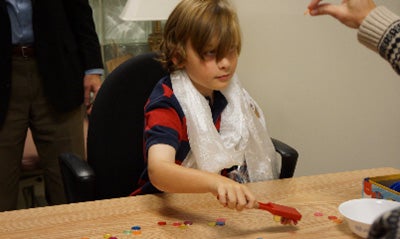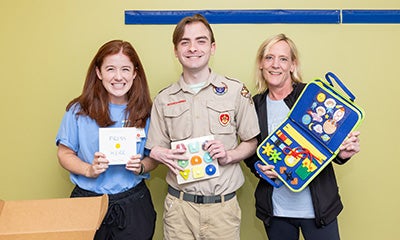Hydrocephalus and cerebral palsy
Rex Everette was the smallest of triplets born at 27 weeks, weighing just 1 pound, 15 ounces. He and his brothers spent six months at the University of Alabama at Birmingham (UAB) Regional Neonatal Intensive Care Unit (NICU), where he suffered from brain bleeds and was ultimately diagnosed with hydrocephalus and cerebral palsy.
“It was a challenging journey. With four boys under the age of 3, including triplets, life was intense,” Jill Everette, Rex’s mom, said. “I split my time between the NICU and our home, caring for our older son. Early intervention began immediately when they came home, involving speech, physical and occupational therapy. Rex had the most appointments due to his diagnosis of cerebral palsy.”
As the triplets grew older, Rex continued to require more care. He underwent two shunt surgeries at Children’s of Alabama, along with Achilles and hamstring procedures at age 7. “Looking back, it's a bit of a blur, but we always moved forward, one step at a time,” Jill said.
 At 6 months old, Rex began both physical and occupational therapies and had constraint induced movement therapy (CIMT), which improves the function of an affected limb, at Children's. He attended multiple sessions until he was about 10. Rex does not use a wheelchair. He has hemiplegia on his right side, so he is weaker in his right leg, but has no issues walking. His main limitations are with his right hand, where he has limited mobility and fine motor skills.
At 6 months old, Rex began both physical and occupational therapies and had constraint induced movement therapy (CIMT), which improves the function of an affected limb, at Children's. He attended multiple sessions until he was about 10. Rex does not use a wheelchair. He has hemiplegia on his right side, so he is weaker in his right leg, but has no issues walking. His main limitations are with his right hand, where he has limited mobility and fine motor skills.
Even when not in active therapy, he consults with his occupational therapist to explore new accommodations for daily tasks. Splints help him use his hand effectively, and he has also discussed options such as Botox or hand surgery with his motor specialist.
“It was challenging and tiring and never a dull moment. There were lots of appointments and therapy sessions,” Jill added. “The triplets received outpatient therapy, therapy at the house and started early intervention at the Bell Center as soon as they came home from the hospital. Life was and still is pretty wild. With four boys, there are lots of moving parts, but they have brought us so much joy.”
When the boys were old enough, their parents decided to have them participate in Boy Scouts. They figured it would be good because Rex's brothers could help him if they were all participating together. “Scouts have always been a great place for the boys to earn independence,” Jill said. “They have always loved camping and hiking and spending time with their friends.”
Recently, Rex became an Eagle Scout, and for his project he created welcome boxes for the patients in the Children’s CIMT program to help them practice their skills at home. He filled them with small therapy items, toys, books, puzzles and a blanket. He also included a personal letter to make them feel welcome. He was inspired to choose this project because of his own experience.
“I wanted to do this because Children’s has always taken care of me and supported me,” Rex explained. “I remember what it felt like to start the CIMT and how scared I was. I also remember that I did not like to wear the cast in the beginning. I wanted to give the kids something when they started the program to make them feel good about what they were doing. I also wanted to show them that I was just like them and wore lots of casts and that it is not going to be easy but that there are people thinking of them while they are going through it.”
Rex and his family can't express their gratitude enough for the exceptional care he received. “Children's holds a special place in our hearts, along with the dedicated team of nurses, physicians and staff,” Jill said. “Rex has always had an incredible support system—a close-knit team ensuring he receives the necessary care and therapy. They are always eager to discuss options, therapies and local services, making things easier for him.
“Children's didn't just see my son for who he was; they envisioned who he could become,” she added. “They recognized him as a person, not just a patient. Over time, our conversations shifted from discussing his care with me to actively involving him. They sought his thoughts, desires and collaborated to make a plan for him. Their unwavering support and exceptional care touched every facet of our journey.”
Rex will be a senior in high school this fall and plans to attend college to study history. His grades are good, and he is active in various programs in the community. He volunteers at the Bell Center, where he received early intervention. He also participates in the Youth Leadership Forum of Birmingham and Leadership Mountain Brook.
Jill believes his journey has required him to mature faster than his peers, adapting in ways few can comprehend. “Rex recognizes that his disability is a part of him but doesn't define him entirely. His intelligence shines, and he's become a remarkable self-advocate. Conversing with him feels like talking to an older soul—witty, insightful and passionate about history and genealogy.”
His fascination with military non-fiction, especially World War II, reflects his thirst for knowledge. “Rex's kindness, thoughtfulness and advocacy have enriched our family,” Jill added. “He's taught us gratitude, mindfulness, inclusivity and the importance of standing up for those overlooked due to their differences.”
Recently, Rex shared his story with peers, discussing diversity, equality and how others perceive his disability. “He candidly expressed that people sometimes see him without truly seeing his strength, intelligence and worth,” Jill said. “Despite the challenges of adolescence, his honesty and resilience shine through.”





